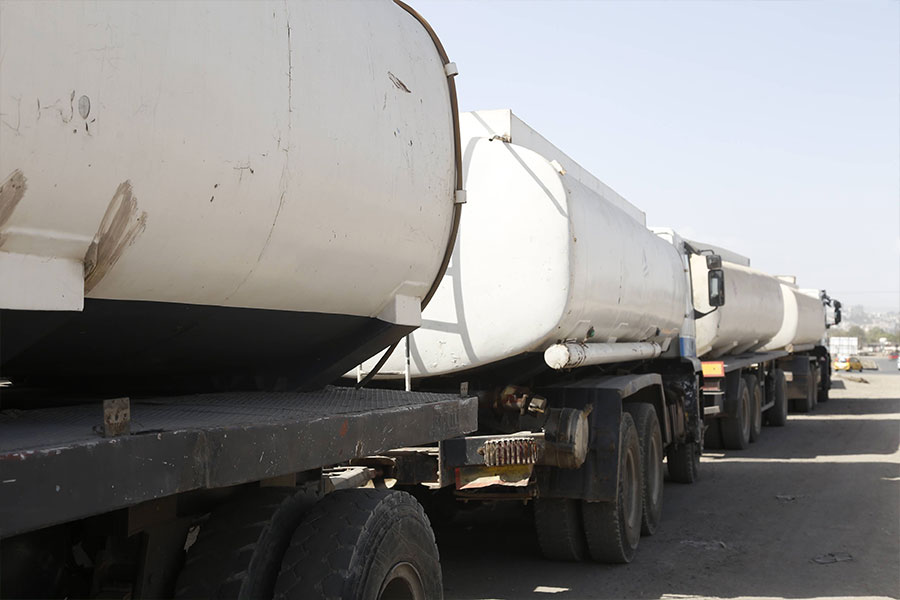
Fortune News | Sep 21,2025
Four months ago, Dawit Hagos, who runs his family's business, MICAS Construction Materials, decided to install Global Positioning System (GPS) satellite tracking on his company's 10 trucks.
Born and raised in Addis Abeba, Dawit Hagos studied management at Meqelle University and opened the business, which rents vehicles, four years ago.
After his decision to install the device, Dawit inked a deal with a local company for the installation of the tracking system for 200,000 Br.
Dawit's company operates five heavy trucks, which currently work on the Ethio-Djibouti road project, and five more Sino trucks that operate in the capital.
Dawit expects the GPS trackers to be installed on the vehicles, which transport metal, cement and other goods from Djibouti, within two weeks.
“We decided to install the trackers to control our property and to prevent theft,” Dawit said.
Though Dawit has started the process of installing the tracking system through his own initiative, the Ethiopian Customs Commission has drafted a law that mandates the insulation of GPS systems on all cargo trucks.
Legislated by the parliament last June, the proclamation mandates the installation of the tracking system on the carriage of goods to control and track the movement of cargo to customs destinations and crossings.
The strict law states that the transporters that fail to install the system may not engage in the transportation of import or export goods.
Commercial, government and all private vehicles have to install the devices, while the directive exempts ambulances, security service cars and military vehicles.
Vehicles that carry containers and petroleum products are also compelled to install the GPS system, according to the new law.
GPS tracking system in the Pepo Speed Limit Company office, which helps to control the location of trucks.
Along with the tracking system, the Federal Transport Authority has also set a new requirement that limits the speed of trucks. It set 80Km an hour and 100Km an hour as limits on heavy trucks and commercial vehicles, respectively.
Previously, the country had a law prescribing GPS tracking to be installed on cargo trucks that transport import-export items. However, it was not mandatory like the new proclamation.
Using the devices, customers can easily access the location of trucks that carry their products online and spot if the vehicles took different routes than the intended ones.
The new law aims at facilitating the customs procedures through technological devices, according to Ashenafi Girma, inspection technology device support team leader at the Commission, which was formed in 2018 after it split from what was then called the Ethiopian Revenues & Customs Authority.
The Commission is in charge of customs and duty matters and directly reports to the Ministry of Revenues.
So far, the Commission has not begun enforcing the installation of the devices and is currently working on awareness creation. The enforcement has not begun, since the proclamation was not published in Negarit Gazette.
Operators have welcomed this new requirement in the industry with mixed feelings. It adds an additional expense to the truck owners while at the same time opening a new business opportunity for the business community.
Yared Bezuwerq, who established Pepo Speed Limit Company in September 2019, is one of them. Pepo operates with 14 employees and imports the systems from China and India.
Before venturing into the business, Yared inked an agreement with the Federal Transport Authority four months ago to engage with the import and distribution of the product.
So far, the Authority has allowed four companies, including Yared, to import the devices. Anahama Trading Plc, ABH Service Plc and Kassa Software Tracking are the remaining three companies.
After passing through a month and a half long process, Yared's company has received the first consignment that carried the system. The device he imports integrates both speed limit and GPS tracking.
GPS trackers which import from China and India by Pepo Speed Limit Company that established in September 2019.
He also plans to import 24,000 speed limit devices and GPS tracking by July 2020 in addition to the 1,320 devices he has already imported.
Depending on the type of the device, Yared charges his customers 10,000 Br to 15,000 Br to install the tools.
Before installation of the device, the Information Network Security Agency (INSA) and Federal Transport Authority are authorised to inspect the imported devices to ensure they fulfill the required standard.
While Yared and other importers cheer the new procedure that opened gave them a business opportunity, some transporters do not welcome it, claiming that they were not consulted during the drafting process of the proclamation.
The Ethiopian Transporters Federation, which was established two years ago and currently has 4,000 trucks as members, is one of them who are voicing concerns.
"The Federal Transport Authority invited us for discussions after the law was legislated," said Dejene Luche, public relations director at the Federation. "As a stakeholder, we should have participated in discussions when the proclamation was prepared."
Two years ago, 88 trucks that are members of the Federation installed GPS tracking devices at a unit cost of 7,300 Br.
These 88 cargo tracers would not work with the new law, since they do not have speed limits. Thus, the owners of these trucks should replace the older one with a device that has a speed limit.
The older GPS devices just alert the Federation when the vehicle attains high speed, but the new one automatically limits the speed of the vehicle.
"This led us into crises, because the owners have previously invested in installing the GPS," he adds. "It will subject them to another expense."
Before the legislation of the proclamation, 402 trucks in the country already installed GPS tracking systems. And 980 newly imported vehicles have installed a tracking system along with a speed limit since March 2019, according to Yigezaw Dagnew, communications director at the Federal Transport Authority.
Beyond regulating the trucks, the new law aims at decreasing traffic accidents caused by speeding, according to Yigezaw.
"The mandatory installation of speed limits will continue on private vehicles," said Yigezaw. "And it'll be enforced on any vehicles by 2020."
Until then, the Authority will be working on awareness creation, according to him.
Currently, the country has approximately 1.1 million cars, of which over half are located in the capital city, while the Afar Regional State has the lowest number of vehicles - 6,596.
Yohannes Woldegebriel, a lawyer who used to work for the then Ethiopian Revenues & Customs Authority, believes that the implementation of the law will not bring significant change in the logistics sector.
Considering the lower know-how surrounding the system and unavailability of a central monitoring system in the country, enforcing the technology would be tough, according to Yohannes.
"As 90pc of the country's import-export goods are transported through the Djbouti corridor," said Yohannes, "they should open a branch office in Djibouti to facilitate the system."
Yohannes also recommends the Commission compose a committee having members from Ethiopian Shipping & Logistics, the Federal Transport Authority and the Customs Commission for the implementation of the new law.
Another expert in the field of transport geography thinks the new law will fail.
Lack of technology know-how, infrastructure like a network to access the satellite and absence of capital will be the main challenges to implement the system, according to Fikadu Gurmessa (PhD), a lecturer of transport geography at Addis Abeba University.
"The government should work on installing a central integrated system to manage the devices," Fikadu said.
PUBLISHED ON
Oct 12,2019 [ VOL
20 , NO
1015]

Fortune News | Sep 21,2025

Radar | Feb 23,2019

Fortune News | Apr 02,2022

Fortune News | Jun 13,2025

Radar | Sep 04,2021

Fortune News | Jul 26,2025

Agenda | Jul 20,2025

Radar | Apr 17,2020

Fortune News | May 25,2024

Radar | Dec 17,2022

Dec 22 , 2024 . By TIZITA SHEWAFERAW
Charged with transforming colossal state-owned enterprises into modern and competitiv...

Aug 18 , 2024 . By AKSAH ITALO
Although predictable Yonas Zerihun's job in the ride-hailing service is not immune to...

Jul 28 , 2024 . By TIZITA SHEWAFERAW
Unhabitual, perhaps too many, Samuel Gebreyohannes, 38, used to occasionally enjoy a couple of beers at breakfast. However, he recently swit...

Jul 13 , 2024 . By AKSAH ITALO
Investors who rely on tractors, trucks, and field vehicles for commuting, transporting commodities, and f...

Oct 18 , 2025
The political establishment, notably the ruling party and its top brass, has become p...

Oct 11 , 2025
Ladislas Farago, a roving Associated Press (AP) correspondent, arrived in Ethiopia in...

Oct 4 , 2025
Eyob Tekalegn (PhD) had been in the Governor's chair for only weeks when, on Septembe...

Sep 27 , 2025
Four years into an experiment with “shock therapy” in education, the national moo...